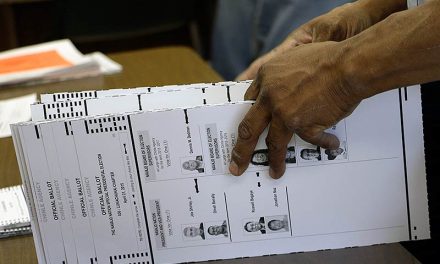
Native News Briefs | Senate committee OK’s Shadow Wolves bill
WASHINGTON
A Senate committee has approved a bill that classifies the Shadow Wolves, comprised of members of the Tohono O’odham Nation, as special agents.
The Shadow Wolves patrol the 76-mile stretch of land the Nation shares with Mexico. They are known for their ability to track drug smugglers who try to smuggle illegal items across the border.
Ned Norris Jr., Tohono O’odham chairman, said, “For nearly 50 years, the Shadow Wolves have helped secure the border, protecting the U.S. homeland and the Tohono O’odham Nation. The country’s only Native American tracking unit, their traditional methods are renowned worldwide.”
The bill, introduced by Sen. Kyrsten Sinema, D-Ariz., reclassifies the Shadow Wolves from tactical officers to special agents, allowing the unit to better investigate and track cross-border criminal activity.
The bill also expands the Shadow Wolves program to other parts of the border.
The U.S. Senate Homeland Security and Governmental Affairs Committee unanimously passed the Shadow Wolves Enhancement Act, co-sponsored Sen. John Hoeven, R-N.D.
Two weeks ago, the U.S. House Committee on Homeland Security unanimously passed the House companion bill, which is led by representatives John Katko, R-N.Y., and Henry Cuellar, D-Texas.
Schatz: Infrastructure deal includes $11B for tribes
WASHINGTON – The U.S. House of Representatives voted to pass a $1 trillion bipartisan infrastructure deal that includes at least $11 billion in estimated funding for Native communities.
The bipartisan Infrastructure Investment and Jobs Act, which U.S. Senator Brian Schatz, D-Hawai‘i, chairman of the Senate Committee on Indian Affairs, voted to pass in the Senate in August, according to a Monday news release from his office.
The bill now heads to the president’s desk to be signed into law.
“Strong federal investment is critical to fulfilling our trust and treaty obligations to Native communities,” Schatz said.
The $11 billion investment in Native communities includes:
• $3.5 billion for the Indian Health Service Sanitation Facilities Construction Program.
• $3 billion for the U.S. Department of Transportation Tribal Transportation Program.
• $2.5 billion to address approved Native American water rights settlements.
• $2 billion for the National Telecommunications and Information Administration’s Tribal Broadband Connectivity Program to expand broadband access on tribal lands and Hawaiian homelands.
Tribes and Native-serving organizations are set to receive additional funding to support transportation enhancement, energy development, water and sanitation construction, broadband deployment, climate resiliency, natural resource management, and environmental remediation, among other infrastructure priorities for Native communities.
Bill introduced to fund water project for White Mountain Apache residents
WASHINGTON – Congressman Tom O’Halleran, D-Ariz., and senators Mark Kelly and Kyrsten Sinema, both Arizona Democrats on Nov. 4 introduced a bill to fund and complete a drinking water infrastructure project for the White Mountain Apache Tribe.
The bill would amend the tribe’s water rights settlement that was enacted by Congress in 2010 by authorizing the use of additional federal funds and extending the time needed to complete the White Mountain Apache Rural Water System and Miner Flat Dam project.
Unforeseen technical delays and cost-overruns in the planning and design of the project require an extension of the deadline set by Congress for constructing the project.
The water project would provide clean, reliable drinking water for tribal members on the Fort Apache Indian Reservation, including Whiteriver, Fort Apache, Canyon Day, Cedar Creek, Carrizo and Cibecue.
Gwendena Lee-Gatewood, chairwoman of the White Mountain Apace Tribe, said, “The legislation will ensure that our members have safe drinking water for generations to come and that the tribe’s water claims are finally resolved.”
NDN Collective fires back at Biden energy plan
GLASGOW, Scotland – In response to the COP26’s theme of “energy,” NDN Collective released the following on Nov. 4.
“Biden has an ambitious plan for electric U.S. vehicles, but it’s unclear where the lithium for these car batteries would come from,” said Lycia Maddocks, political director at NDN Collective.
“Even with recycled lithium, there isn’t enough supply to meet the demand of this plan,” she said. “As we see an uptick of lithium mining in the U.S., Australia, Europe, and Latin America, Indigenous people – like the Atacama of Chile and Argentina and the Atsa koodakuh wyh Nuwu people of Thacker Pass in Nevada – are fighting the process of lithium extraction that’s already polluting their soil, water, and air.”
The Biden administration says solutions are backed by science but environmental impact statements are skipped or skirted, and Indigenous land rights are violated, Maddocks said.
“All for quick and cheap manufacturing,” she said, “before the science and data is even available.”
All climate projects must start with free, prior, and informed consent of Indigenous people, she added, anything that doesn’t involve support from Indigenous communities is not a true climate solution.
Demetrius Johnson, Landback organizer at NDN Collective, said, “Right now, there are over 15,000 households without electricity in the Navajo Nation. Meanwhile, the fall of coal turned into the rise of natural gas, creating massive projects like the one Navajo Nation and Pueblo tribes are currently battling near Chaco Canyon, a sacred UNESCO site.”
The land is fracked and power created from natural gas is being outsourced to other areas.
“All while my people endure man camps that threaten our women and LGBTQ2+ relatives,” Johnson said, “explosions from nearby oil rigs, dangerous air quality, and roads destroyed by natural gas transport vehicles – all on top of us not having access to any of that power.”
The only way to end this never-ending cycle of extraction is to return Indigenous lands to Indigenous hands, he said.








 Highway 264,
Highway 264, I-40, WB @ Winslow
I-40, WB @ Winslow